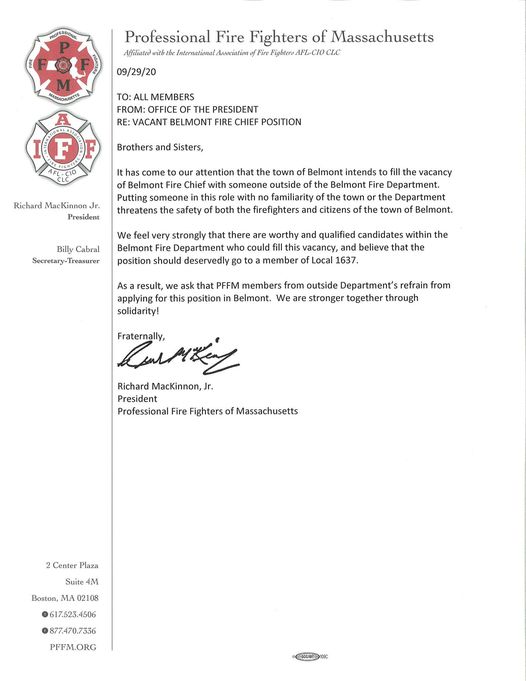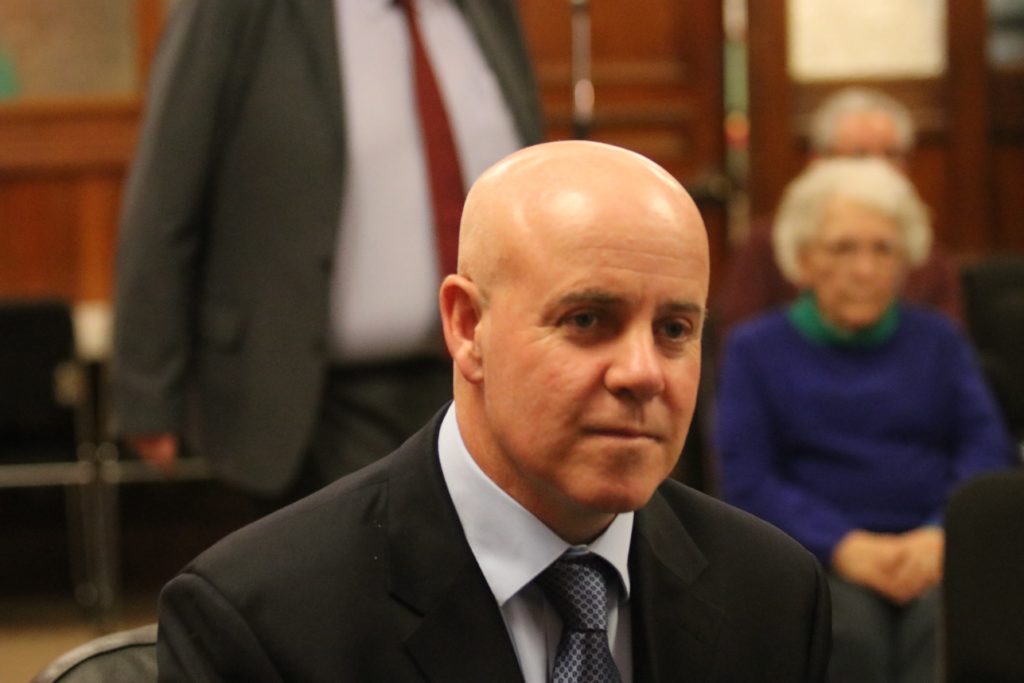Photo: Patrice Garvin, Belmont Town Administrator
Belmont Town Administrator Patrice Garvin received a “perfect” five out of a possible five cumulative score from the Belmont Select Board at her annual merit pay review on Monday, Sept 9.
“Spectacular!” said Kelli King, the town’s Human Resources Manager, after reading the results. The score is due to Garvin’s exceptional skills in finance, administration, staff development, and problem-solving, said King.
“Patrice is a patient yet courageous change agent who is creative, forward-looking, and resilient under pressure. Her integrity is unquestionable, and she quickly resolves mistakes when they occur. Her confidence in managing daily operations has allowed the Board to focus on strategic growth initiatives,” said Kelly, summerizing the Select Board’s comments. “Patrice’s ability to multitask, organize, and lead through change has been essential to Belmont’s continued success in areas of opportunity.”
King said Garvin “plays a key role in balancing challenges, changes, and investments in under-resourced departments. She navigates diverse opinions within the town diplomatically and remains insightful in her recommendations for progress and overall comments.”
The one concern the Board has about Garvin’s performance is her ceaseless work ethic, which has the Select Board worried about “potential burnout.” But with a strong team surrounding her, “it is hoped that she can take more time to rest.”
“Her tireless efforts have made the board more effective, and she continues to perform her duties at the highest level, and [it] is a privilege to work alongside her,” said King.
Select Board Chair Elizabeth Dionne added Monday that Garvin’s score, in particular, reflects her work justifying and helping the town pass this year’s Proposition 2 1/2 override.
“If that override had not passed, we would have decimated town institutions and services. The current status of the town very much owes itself to Patrice and her efforts, among many, many others, but Patrice was critical in that effort,” said Dionne.
“If the scale went to six [out of five], I would go to it,” said the Select Board’s Roy Epstein at Monday’s meeting.
Since Garvin has been a target of online criticism and social media attacks from residents, the Select Board reiterated its full support of the administrator, making clear to the public that she is executing its decisions and not acting independently.
“I have seen Patrice at times express reservations or concerns about the course of action the Select Board decided to take,” said Board Chair Elizabeth Dionne, noting the Board’s decision to end Civil Service at the Police Department. “We asked her to do it. She did it anyway, without complaint and without ever suggesting or even hinting that she was concerned about the timing.”
Thanking the Select Board, Garvin noted that while “it’s a tough job sometimes” … “[c]learly, your support gets me through difficult evenings”, including the contentious meeting with the Council on Aging that took place one hour earlier on the organization of the new Human Services Department.
“I want the community to understand that my dedication to the position in the community is evident in the work I do with the staff I lead. If anything, I can’t do any of it without the staff that’s in place and without the volunteers. That is a team effort,” she said.
“I’ve always put my heart and soul into everything I’ve done. It’s been a privilege working here,” said Garvin.
Dionne said budget constraints limited Garvin’s merit increase to two percent, which upped her annual salary by an estimated $216,800. The Board did provide a sweetener with a change to her contract to provide a two-to-one match for deferred compensation up to $10,000, whereas for every $100 Garvin contributes to a compensation plan, the town will contribute $200.
“And to be clear, even if she reaches the $10,000 [ceiling], she is still below market when we look at comparables for other towns,” said Dionne.
For comparison, the annual salaries for town managers/administrators in nearby communities:
- Arlington’s Sanford Pooler received $188,583 in 2022;
- Lexington’s James Malloy took home $238,142 in 2023;
- Winchester’s Beth Rudolph made $215,995 when she was hired in 2023.
- Concord’s Kerry Lafleur received $246,671 in 2023.
- Burlington’s Paul Sagarino Jr. received $243,834 in 2023.

